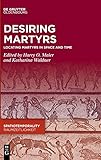Desiring Martyrs : Locating Martyrs in Space and Time / ed. by Harry O. Maier, Katharina Waldner.
Material type: TextSeries: SpatioTemporality / RaumZeitlichkeit : Practices-Concepts-Media / Praktiken - Konzepte - Medien ; 10Publisher: München ; Wien : De Gruyter Oldenbourg, [2020]Copyright date: ©2021Description: 1 online resource (VIII, 236 p.)Content type:
TextSeries: SpatioTemporality / RaumZeitlichkeit : Practices-Concepts-Media / Praktiken - Konzepte - Medien ; 10Publisher: München ; Wien : De Gruyter Oldenbourg, [2020]Copyright date: ©2021Description: 1 online resource (VIII, 236 p.)Content type: - 9783110682489
- 9783110682717
- 9783110682632
- online - DeGruyter
- Issued also in print.
| Item type | Current library | Call number | URL | Status | Notes | Barcode | |
|---|---|---|---|---|---|---|---|
 eBook
eBook
|
Biblioteca "Angelicum" Pont. Univ. S.Tommaso d'Aquino Nuvola online | online - DeGruyter (Browse shelf(Opens below)) | Online access | Not for loan (Accesso limitato) | Accesso per gli utenti autorizzati / Access for authorized users | (dgr)9783110682632 |
Frontmatter -- Preface -- Table of Contents -- Introduction -- Sacral Meals and Post-Traumatic Places: Revision and Coherence in the Epistle to the Hebrews -- “Who are these clothed in white robes and whence have they come?”: The Book of Revelation and the Spatiotemporal Creation of Trauma -- Murder at the Temple: Space, Time and Concealment in the Proto-gospel of James -- Roman Judge vs. Christian Bishop: The Trial of Phileas During the Great Persecution -- Pure Bread of Christ: Imperial Necropolitics and the Eucharistic Martyrdom of Ignatius -- From Prison to Palace: The Carcer as Heterotopia in North African Martyr Accounts -- Bones Ground by Wild Beast’s Teeth. Late Ancient Imaginations of the Death of Ignatius of Antioch -- When the City Cries: The Spacetime of Persecution in Eusebius’ Martyrs of Palestine -- Making Martyrs Mennonite -- About the Authors -- Index of Ancient Authors -- Index of Subjects
restricted access online access with authorization star
http://purl.org/coar/access_right/c_16ec
Martyrs create space and time through the actions they take, the fate they suffer, the stories they prompt, the cultural narratives against which they take place and the retelling of their tales in different places and contexts. The title "Desiring Martyrs" is meant in two senses. First, it refers to protagonists and antagonists of the martyrdom narratives who as literary characters seek martyrs and the way they inscribe certain kinds of cultural and social desire. Second, it describes the later celebration of martyrs via narrative, martyrdom acts, monuments, inscriptions, martyria, liturgical commemoration, pilgrimage, etc. Here there is a cultural desire to tell or remember a particular kind of story about the past that serves particular communal interests and goals. By applying the spatial turn to these ancient texts the volume seeks to advance a still nascent social geographical understanding of emergent Christian and Jewish martyrdom. It explores how martyr narratives engage pre-existing time-space configurations to result in new appropriations of earlier traditions.
Issued also in print.
Mode of access: Internet via World Wide Web.
In English.
Description based on online resource; title from PDF title page (publisher's Web site, viewed 28. Feb 2023)


